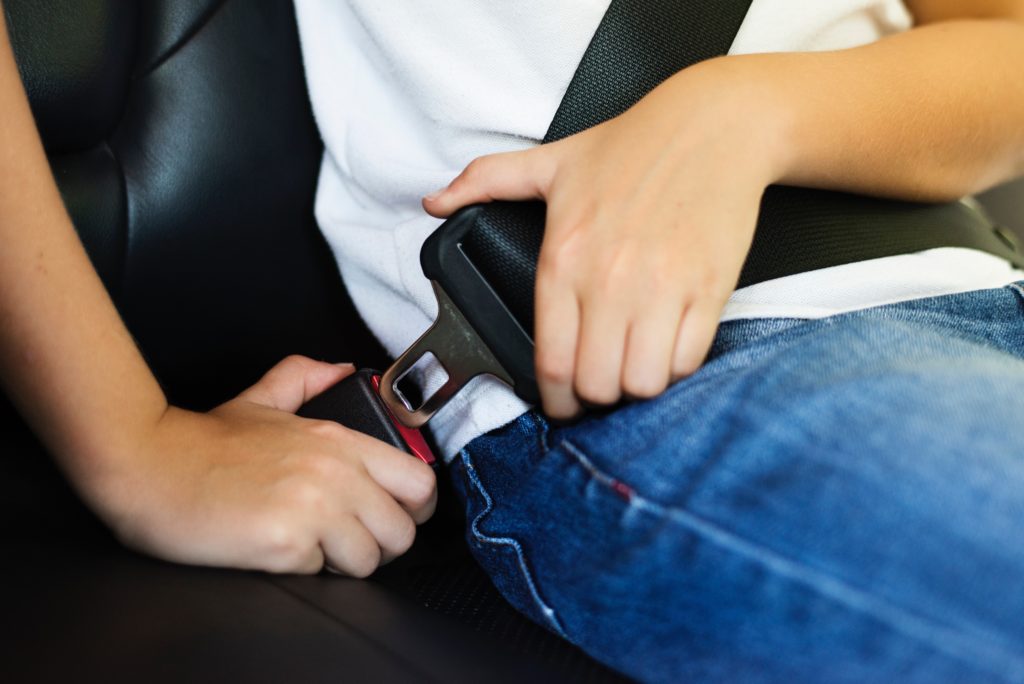North Carolina state law requires each person in a motor vehicle to use a seatbelt. The requirement extends to backseat passengers, and it does not matter if an individual is in a car, truck, SUV, or passenger van. Children younger than 16 must be “properly secured in a child passenger restraint system or seat belt which meets federal standards applicable at the time of its manufacture.”
As personal injury attorneys in Virginia Beach and North Carolina, we encourage compliance with these laws. Buckling up saves lives. At the same time, provisions inserted in both the seatbelt and the child restraint laws make it clear that failing to use a seatbelt or forgetting to strap in a young passenger does not prohibit filing and collecting on insurance claims.
Primary Enforcement
North Carolina has primary enforcement of seat belt laws. This means that law enforcement officers can stop and ticket drivers or passengers solely for not wearing seat belts without requiring any other traffic violation.
- Front seat occupants: All drivers and front-seat passengers are required to wear seat belts at all times when the vehicle is in motion. This applies to both passenger cars and trucks. Failure to do so can result in fines and penalties.
- Rear seat occupants: In North Carolina, there is no specific law mandating that rear-seat passengers wear seat belts in all circumstances. However, if a rear-seat passenger is under 16 years old, they must wear a seat belt regardless of their seating position.
North Carolina’s Child Safety Seat Law
North Carolina has strict child safety seat laws. Children younger than eight years old or weighing less than 80 pounds must be secured in a child safety seat or booster seat appropriate for their age, weight, and height. Children who are at least eight years old or weigh 80 pounds or more must wear a seat belt.
BuckleUpNC recommends placing children younger than 12 months and weighing less than 20 pounds only in rear-facing safety seats in the backseat. The nonprofit also advises parents and caregivers to check whether a safety seat placed in the front passenger position is certified for use with an airbag.
Exemptions From the North Carolina Seatbelt Law
Exemptions from the general seatbelt law (N.C.G.S. 20-135.2A) and the child restraint law (N.C.G.S. 20-137.1) exist, such as for individuals with medical conditions that prevent them from wearing seat belts. Additionally, vehicles manufactured before 1968, motorcycles, and postal vehicles are exempt from seat belt requirements.
Exemptions from the child restraint law are limited to “ambulances or other emergency vehicles; if all seating positions equipped with child passenger restraint systems or seat belts are occupied; or to vehicles which are not required by federal law or regulation to be equipped with seat belts.”
Enforcement of North Carolina’s Seatbelt Law
The statutory fine for a driver or front-seat passenger (16 years of age or older) who does not use a seatbelt is $25.50 plus court costs and fees. For subsequent violations, the fines may increase, and points may be added to the driver’s record. Rearseat occupants 16 years of age or older not wearing a belt can be fined $10.
Enforcement of North Carolina’s Child Restraint Law
Drivers who fail to properly restrain children younger than 16 face a maximum fine of $25 and two penalty points against their license. The penalty is capped per vehicle, so transporting more than one child who is not properly restrained will not bring additional fines or points.
The law permits ticketed drivers to avoid the penalty entirely by providing a traffic court with documentation of installing an appropriate child safety seat.
How Not Wearing a Seatbelt or Using a Child Safety Seat Affects Insurance Claims
North Carolina courts cannot consider failing to buckle up to be a type of contributory negligence. This is very important because any finding of contributory negligence invalidates personal injury and wrongful death claims.
North Carolina and Virginia are two of just four states that continue following the outdated and unjust common law rule of contributory negligence. It is good that the seatbelt law recognizes that failing to buckle up has nothing to do with causing a traffic accident.
Talk to a North Carolina Car Accident Lawyer
If you were injured in a North Carolina auto accident, you must speak with an attorney about the legal options that are available to you. Schedule a free, no-obligation consultation with a reputable North Carolina or Virginia Beach car accident lawyer from Shapiro, Washburn & Sharp. We know what it takes to see a successful resolution to your car accident case.
